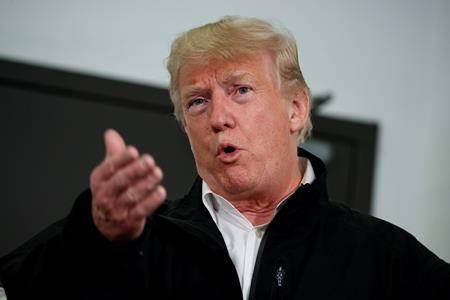An American cannabis producer is warning President Donald Trump that Canada is poised to dominate the North American marijuana industry unless the United States takes steps to eliminate barriers to financing and market capital south of the border.
A full-page ad in Tuesday’s Wall Street Journal, framed as a plea to the White House and its most prominent occupant, warns the U.S. is rapidly losing its competitive advantage to Canada, where recreational pot becomes legal at midnight.
“The cannabis industry is legal in 31 states, yet most domestic companies do not have access to traditional banking or institutional financing,” reads the ad, signed by Derek Peterson, the chairman and CEO of California-based Terra Tech Corp.
“As a result, many U.S. companies are being forced to move to the Canadian public markets to access capital and build their businesses.”
The ad also warns that Canadian firms have tapped into U.S. investor interest in order to raise and spend money in order to acquire American cannabis assets.
“Regrettably, this will put what should be one of our homeland’s greatest economic drivers in foreign control.”
As of Wednesday, Canada will be the first G7 member to greenlight legal recreational pot — a move Prime Minister Justin Trudeau has justified as an effort to better protect young people from the drug’s effects and eliminate the influence of organized crime.
In an interview, Peterson admitted to having mixed feelings about the momentous paradigm shift that’s scheduled to begin north of the border when the Trudeau government’s promise to legalize recreational pot finally becomes a reality.
“It’s a double-edged sword,” he said. “I’m afraid of the economic impacts right now if we don’t do anything, but at the same time, (Canada) really triggered and ignited the national discussion.
“I literally would categorize that as the single most pivotal point in our own path towards legalization, that they took the initiative to do it.”
The challenge for U.S. firms lies in the fact that while recreational cannabis is legal in nine states and medicinal pot in 22 others, it remains illegal under federal law. Sending product across state lines is impossible, as is the ability for companies to obtain financing from major banks.
Federal statutes aimed at curtailing the cocaine trade in the 1980s remain on the books, making it impossible for companies like Terra Tech to deduct routine business expenses and capital equipment like computers and payroll costs against their taxes, Peterson said.
Producers have to rely on smaller financial institutions like credit unions for financing, while the major players in the world of institutional capital have been flocking to back Canadian rivals, he added.
The result is what Peterson called a “federal illegality tax” that extends across the spectrum of a U.S. producer’s operations and swallows profit margins whole.
“The reality is, like it or hate it, you guys are getting a first-mover advantage,” he said of the Canadian industry.
“We’re sitting here with no access to banking, getting our credit cards shut off, having all these crazy headwinds due to the dichotomy between state and federal law, and you guys took the first-mover advantage from the federal perspective and you’re reaping the rewards of it.”
The solution, Peterson writes, is for the U.S. government to allow states to enact their own cannabis regulations “so that we can fairly compete and protect our domestic industry before it’s too late.”
The federal philosophy on recreational pot in the U.S. has been fraught with confusion since Trump was elected in 2016.
Despite campaigning on a promise to leave the issue up to individual states, the White House appeared to reverse course earlier this year by rescinding the so-called Cole memorandum, an Obama-era edict that prevented federal interference with those states where recreational cannabis is legal. Trump has since insisted, however, that the federal law would not be enforced in those jurisdictions.
Rep. Dana Rohrabacher, a Republican congressman from California, has since said he has been assured that Trump plans to proceed with reforming federal marijuana laws as they pertain to medicinal pot once next month’s midterm elections are over.
“The global cannabis boom, for raising money in Canada, has just been absolutely incredible,” said Anthony Durkacz, majority owner of First Republic Capital and a director of cannabis producer FSD Pharma, based in Cobourg, Ont.
But Durkacz said the growth in the Canadian industry thus far could prove to be only the tip of the iceberg if Trump follows Peterson’s advice and starts lowering barriers to the production and sale of marijuana — something he considers an inevitability.
“Canada is a very, very small country — economically we are tiny. There’s more money in Manhattan alone than all of Canada, by multiples,” he said.
“For us, where the good times and the bullish market will continue is if America legalizes cannabis.”
James McCarten, The Canadian Press



